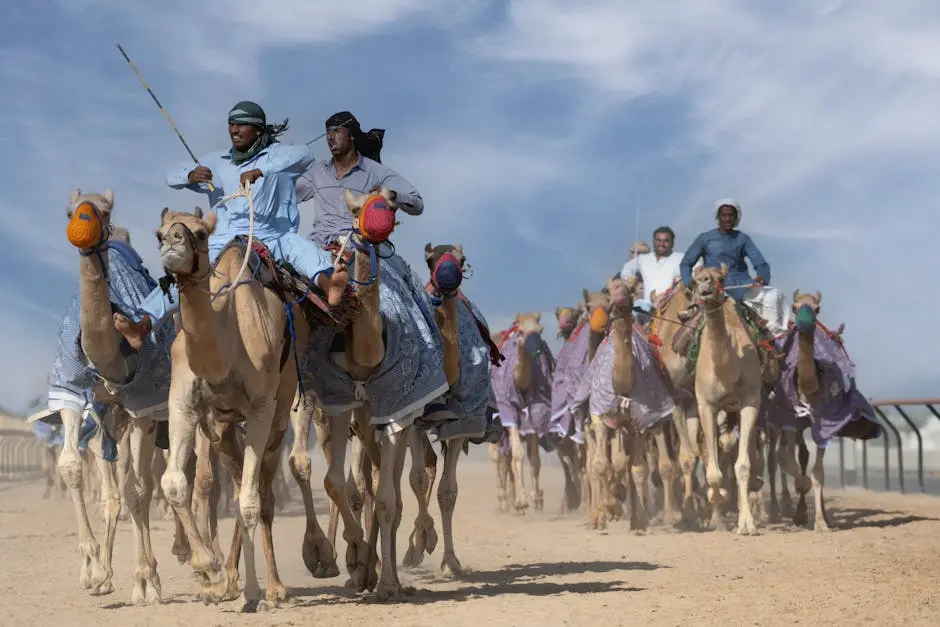What are the top UAE Traditional Sports and Games?
The UAE is not only renowned for its stunning architecture and rich history, but it also boasts a vibrant culture deeply rooted in traditional sports and games. In this post, we’ll explore some of the most fascinating traditional sports that reflect the heritage and spirit of the UAE. From the thrill of falconry to the skill of camel racing, let’s dive into the heart of UAE’s sporting traditions.

The Art of Falconry
Falconry is not just a sport in the UAE; it is a revered art form that reflects the nation’s connection with nature and its history. Dating back centuries, falconry has been practiced by generations, and these magnificent birds of prey are a symbol of pride and strength. The traditional practice of training these birds requires patience, skill, and an understanding of their behavior, making it a captivating sport for both participants and spectators.
At many local events, one can witness breathtaking displays of falconry, where trained falcons swoop and dive, showcasing their agility and speed. Competitions, such as the Sheikh Mohammed bin Rashid Al Maktoum Falconry Cup, draw participants from all around the Gulf, and the excitement in the air is palpable. The bond between the falconer and their bird is built not only on training but also on deep respect and love for the species.
In addition to the thrill of the chase, falconry also carries significant cultural importance. The sport has become a key element in the UAE’s identity, illustrating the traditional values of perseverance, courage, and grace. Many falconry schools and programs are established to educate the younger generation about this noble practice, ensuring that this historical sport continues to thrive in the UAE.
The Thrill of Camel Racing
Camel racing is one of the most celebrated traditional sports in the UAE, captivating audiences with its speed and excitement. This unique sport dates back hundreds of years, serving as both a form of entertainment and a symbol of cultural heritage. The majestic camel, often referred to as the ‘ship of the desert’, has long been an integral part of Emirati life, acting as a companion and means of transport. Consequently, camel racing has evolved into a thrilling spectacle that attracts both locals and tourists.
Races take place on specially designed tracks and attract a large number of spectators who come to cheer on their favorite camels. The robots that act as jockeys are a fascinating aspect of modern camel racing, enhancing animal welfare while also providing a glimpse into how technology and tradition intersect. With these robotic riders, the sport has become even more exciting, as the camels race toward the finish line at breathtaking speeds.
Moreover, camel racing is more than just a contest; it’s a community event. Families and friends gather, sharing meals and stories, fostering a sense of camaraderie that resonates throughout the day. Festivals dedicated to camel racing celebrate not only the sport itself but also the cultural significance of camels in Emirati society, making it a lively event that engages people of all ages.
The Challenge of Dhow Racing
Dhow racing represents the maritime heritage of the UAE, showcasing the deep connection the Emirati people have with their waters. Traditionally, dhows were not just vessels for fishing and trading; they were also a testament to the craftsmanship and ingenuity of the region’s seafaring people. Today, dhow racing has evolved into a thrilling competition that captures the spirit of adventure and teamwork.
Races are held during traditional festivals, where sailors demonstrate their skills while navigating their beautifully crafted dhows through the azure waters of the Arabian Gulf. These competitions are often steeped in history, attracting enthusiastic crowds along the shorelines. The sight of dhows racing side by side, their sails billowing in the wind, is nothing short of magical. Such events preserve the age-old skills passed down through generations, ensuring that the art of sailing remains vibrant.
Dhow racing also fosters a sense of unity and pride among participants. Families gather to support their teams, celebrating victories and learning from defeats. This sport embodies the resilience and camaraderie of the Emirati people, making it a significant part of national celebrations and cultural heritage.
The Joy of Al Ayyalah Dance
The Al Ayyalah dance is a traditional performance that not only entertains but also conveys important cultural narratives of the UAE. This expressive and dynamic dance involves a group of men who perform intricate movements while holding long sticks, often accompanied by poetic verses that tell stories of courage, unity, and tradition. Al Ayyalah is characteristic of its rhythmic clapping and chanting, creating a captivating ambiance for both performers and spectators alike.
Typically performed at festivals and celebrations, Al Ayyalah serves as a vibrant display of community spirit. The dances reflect the values of precision and discipline, as groups practice for countless hours to perfect their routines. These performances are not merely about the choreography; they are about the pride and identity of the Emirati culture, allowing people to connect with their ancestral roots.
In recent years, efforts to preserve and promote Al Ayyalah have increased, making it a cherished component of local heritage. Schools and cultural organizations actively teach young Emiratis this traditional dance, ensuring its survival for generations to come. The communal spirit around Al Ayyalah invites everyone to participate, making it a joyful celebration of culture and heritage.
The Excitement of Salukis Racing
Saluki racing is another thrilling sport that highlights the deep bond between Emiratis and their hunting dogs. The Saluki breed, known for its grace and speed, has a long-standing significance in the region. Traditionally used for hunting, these dogs are revered not only for their prowess but also for their loyalty. Saluki racing has evolved into a competition that showcases their exceptional abilities, captivating audiences around the nation.
Competitions are often held in beautiful desert settings, where trained Salukis chase after a lure in a display of incredible agility. Spectators gather, their excitement palpable as they cheer on their favorite competitors. The sport celebrates not only the speed of the Salukis but also the skilled training and nurturing provided by their handlers, reinforcing the longstanding relationship between human and animal.
Beyond the competitive aspect, Saluki racing also emphasizes the cultural connections of the UAE. It highlights the importance of preserving heritage, where events are often accompanied by traditional music, food, and festivities. Visitors can immerse themselves in an experience that blends enjoyment with education, learning about the history of Salukis while reveling in the excitement of the race.
Traditional Stick Fighting
Traditional stick fighting, known locally as ‘Ayyalah’, is a captivating sport that combines skill, strategy, and cultural significance. This ancient practice, performed in a competitive format, involves pairs of fighters who wield sticks in a show of agility and strength. Stick fighting not only provides an exhilarating spectacle for spectators but also serves as a representation of Emirati resilience and honor.
Participants undergo rigorous training to master the techniques and tactics involved in this sport. It requires remarkable coordination, reflexes, and composure under pressure. Traditional stick fighting events often draw significant crowds, where the energy is electric, and the sense of community is palpable. Supporters rally behind their favorites, creating an encouraging atmosphere that celebrates local culture.
Furthermore, this sport is an essential part of UAE’s heritage, often featured in festivals and cultural displays. It provides a channel to engage younger generations in traditional practices, fostering pride in their history and identity. As stick fighting continues to evolve, preserving its traditional roots while adapting to modern influences ensures that this unique sport remains a vibrant part of the UAE’s cultural landscape.
The Passion for Horse Riding
Horse riding is more than a favored pastime in the UAE; it embodies the spirit of the nation’s deep connection with equestrian culture. Horses have played a crucial role in Emirati history, utilized not only for transportation but also in battles and celebrations. Today, horse riding continues to be an esteemed tradition, celebrated through various events, including races and festivals that highlight the skills of both horse and rider.
In the UAE, various breeds, especially the Arabian horse known for its endurance and elegance, dominate the equestrian scene. Many riders invest time in training and nurturing their horses, instilling values of commitment and respect for the animal. Horse shows and competitions attract both local and international audiences, who are enchanted by the beauty and strength of these magnificent creatures.
Moreover, horse riding serves as a means to connect with the country’s rich heritage. Events like the Sir Bani Yas Horse Festival highlight not only the beauty of equestrian sports but also emphasize the importance of preserving traditional practices. By engaging with this sport, locals and visitors alike can experience the nurturing relationship between humans and horses, fostering a deep appreciation for the cultural significance they hold within Emirati society.

